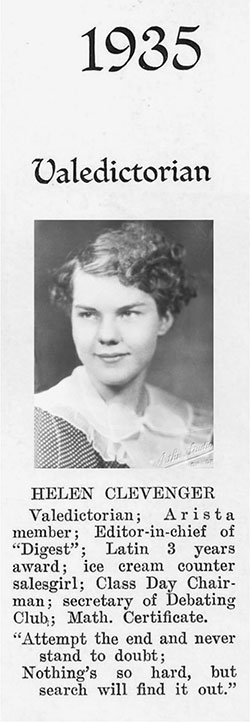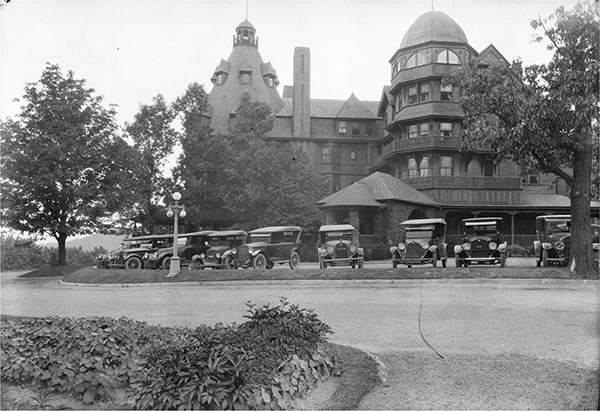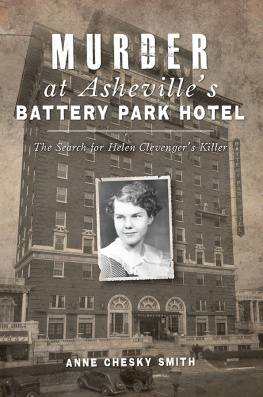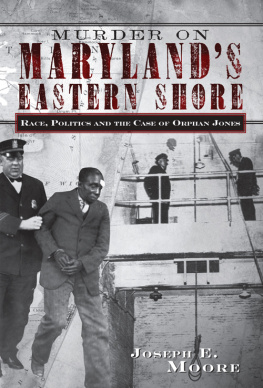

Published by The History Press
Charleston, SC
www.historypress.com
Copyright 2021 by Anne Chesky Smith
All rights reserved
Author photograph courtesy of Nathan Rivers Chesky Photography.
First published 2021
E-Book edition 2021
ISBN 978.1.43967.307.2
Library of Congress Control Number: 2021937193
Print Edition ISBN 978.1.46714.560.2
Notice: The information in this book is true and complete to the best of our knowledge. It is offered without guarantee on the part of the author or The History Press. The author and The History Press disclaim all liability in connection with the use of this book.
All rights reserved. No part of this book may be reproduced or transmitted in any form whatsoever without prior written permission from the publisher except in the case of brief quotations embodied in critical articles and reviews.
CONTENTS
WHAT A RITZY PLACE BATTERY PARK HOTEL
Helen Clevenger stepped out of the passenger seat of her uncles car into familiar territory. Though she had spent only a quick weekend in the mountain town of Asheville, North Carolina, a few days before, the bustling city and the centrally located Battery Park Hotel had started to seem like a home base of sorts.
It was July 1936, and the slim, blond teenager was eager to travel. She had just finished her freshman year at New York University, and the native Staten Islander had never seen the American South.
Helens father, Joseph, had concocted the plan for Helens bachelor uncle to escort her across the Old North State that summer. We were devoted pals, and for fear I was binding my daughter too much to my life and ideas, I arranged for her to visit her relatives in North Carolina and travel some with her Uncle Billy, Joseph explained to a friend.
Though William had not seen much of [Helen] since she was a child, when his brother wrote asking if Helen could accompany him as he completed his summer dairy work, William readily agreed. Joseph told William that Helen had been working hard in school, and Joseph wanted her to have the advantage of traveland the opportunity to meet some of [Williams] friends. Helen quickly warmed up to her uncle. She was becoming sweeter and sweeter to me every day, he said of the young woman.

Helen Clevenger, senior class, Tottenville High School (Staten Island, New York) yearbook, the Purple Parrot, 1935. Tottenville Historical Society, Staten Island, New York.

The Clock, a poem written by Helen Clevenger, published in the 1934 edition of the Tottenville High School (Staten Island, New York) yearbook, the Purple Parrot. Tottenville Historical Society, Staten Island, New York.
Helens mother, Mary, was not as keen as her husband for their daughter to spend the summer traveling to strange towns with strange people. I didnt want her to go, Mary said, but then you know how mothers are. I was always afraid to let her out of sight. I begged her not to leave me at first, but she was so anxious to go I finally consented. Helen dismissed her mothers concerns: Oh, mother, Im no baby. I can take care of myself.
So, Helen traveled south, arriving in the state capital of Raleigh at the beginning of July to first visit with another of her fathers brothers, Clinton, who also taught at North Carolina State. She spent her days in Raleigh swimming at the college pool, playing chess with her uncle and waking up early to get in a game of tennis before the temperature rose. After a few days of relaxation, Helen repacked her belongings, and she and William set out.
The first week of the trip was a whirlwind. Beginning July 6, Helen and William traveled from Raleigh in the center of the state to North Carolinas coast, back to Raleigh and then circumnavigated the northwestern part of the state before arriving in Asheville at the Battery Park Hotel on Friday, July 10.
A budding writer and the valedictorian of her high school class, Helen had served as editor-in-chief of the schools newspaper and published poems in the yearbook. As she traveled, she took time every day to carefully record her experiences in her diary and pen lengthy letters to her family and friends. After her first full day in Asheville, Helen wrote her parents, catching them up on what she had done since leaving Raleigh.
Dear Mom and Dad,
Uncle Billy and I started on our trip West. Went through Durham and stopped at Burlington where I went through the plant and had a chocolate ice cream cone. At Greensboro I saw butter cut and milk bottled. At High Point I saw ice cream made and ice pops. We had ice cream fresh from the beater and also ice cream pop at Lexington.
I had a bottle of orangeade and a dipper of peach ice cream. Thursday night, we stopped at Lenoir at a sort of boarding house.
Yesterday, Friday, we had a lovely trip. We traveled through the Blue Ridge Mountains all day. The scenery was beautiful. The highest elevation we were on all day was about 4,247 feet. Stopped at Blowing Rock a point of interest where we climbed up sort of a [ladder] and had a sweeping view of the mountains.
We stopped for a while at Sugar Grove where we saw an operating cheese factory run by a Mr. Grant who said, I feel sorry for anyone who has to return to New York. He told me he had been to New York.
We also stopped at West Jefferson where I saw cheese made at a Kraft Phoenix factory. Ive got the process written down in my diary but Im not sure its exactly right and Ill tell you more about it when I get home.
We then drove back on our tracks stopping at Blowing Rock for lunch. Drove through some beautiful mountains and arrived in Asheville about 6:30.
Uncle Billy is working this morning and Ill have some time to myself, so Im catching up with my correspondence. Ill write you again soon.
Lots of love to both of you.
After two full days in the city, a Battery Park bellhop loaded Helen and her uncles luggage into the trunk of Williams car and the pair traveled farther west, visiting the small towns scattered around southwestern North Carolina. They arrived back in Asheville on July 14 and checked back into the fashionable resort hotel.
Less than thirty-six hours later, William discovered Helens lifeless body crumpled on the floor of her hotel room. But Helen was not the only one to lose her life from the events that unfolded at the Battery Park in the early morning hours of July 16, 1936. Her death became a strand in a tangled knot of politics, police brutality and systemic racism that would, before the end of the year, entrap another young soul.
ASHEVILLES NEW BATTERY PARK Hotel sat in the same location (albeit forty feet lower), just northwest of the heart of downtown Asheville, as the original Battery Park Hotel, which had been a sprawling Queen Annestyle, five-hundred-room resort hotel. The first hotel, perched on the top of Battery Portera former Confederate batteryboasted incredible views of the surrounding mountains and was considered to be the height of luxury at the time.

Next page













